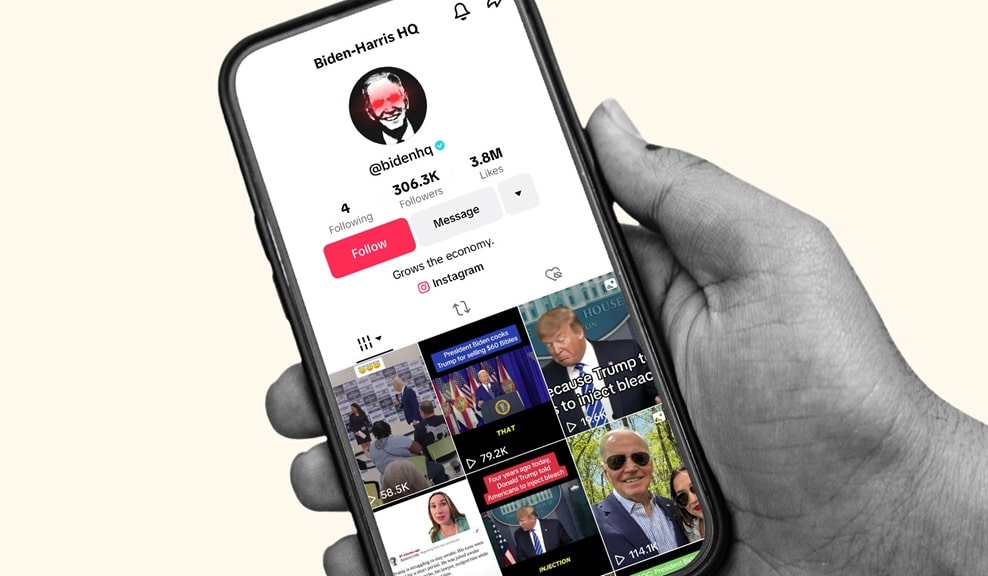Election News
Despite Banning TikTok Biden’s 2024 Election Campaign Keeps Using Platform

President Joe Biden’s re-election campaign says it would continue to use its TikTok account even after he signed legislation requiring its parent company, Beijing-based ByteDance Ltd., to sell its interest or face a ban from US app stores.
The measure was part of a foreign aid package that released long-stalled aid to Ukraine and Israel. Even before it was linked to the package, Biden expressed support for the divest-or-ban campaign, citing worries about Americans’ data security and privacy.
The Biden re-election team says it will use “every tool we have to reach young voters where they are” and promises to continue doing so with “enhanced security measures.”
The statements came after Mr. Biden signed the so-called “TikTok ban,” which landed at his desk buried inside a large international aid package on Wednesday. Despite his campaign’s comments on the subject, Mr. Biden avoided questions about TikTok at a press conference on Wednesday after signing the legislation.
TikTok’s ownership by ByteDance: File Image
The law requires ByteDance, the parent firm of the video-sharing app, to sell the bill within the next nine months. If not, TikTok will be withdrawn from App Stores in the United States. This means that the prohibition may go into effect as early as next January, after the 2024 election season has concluded.
However, his campaign’s decision to use the Chinese-owned social media platform contrasts sharply with what the White House has said about the app.
Earlier this month, White House National Security Communications Advisor John Kirby told reporters, “TikTok’s ownership by ByteDance gives us pause and reason to be concerned about the security of data on that application and the use of that data by a company that has close ties to the Chinese Communist Party.”
The Biden team first debated whether to use TikTok as part of its campaign strategy, but joined the platform in February and has already amassed over 306,000 followers. (Donald Trump is not on TikTok, but has capitalized on the topic, writing on his Truth Social account Monday that Biden would be “responsible for banning TikTok,” adding, “He is the one pushing it to close, and doing it to help his friends over at Facebook become richer and more dominant.”
Biden didn’t mention TikTok when he signed the law on Wednesday. Instead, he focused on the aid package for Ukraine, stating that shipments would begin within the “next few hours.” During a call with China’s Xi Jinping earlier this month, he reportedly raised alarm over the app’s Chinese ownership.
TikTok Users Slam Biden: File Image
As expected, the bill’s passing sparked a deluge of angry comments on Biden’s recent TikTok videos.
The most popular remark on Biden’s most recent tweet said, “You just guaranteed [sic] Trump’s victory with the TikTok ban.”
“Keep TikTok, and I’ll vote for you,” another said. (“Keep TikTok” was the prevailing sentiment among users, with the majority using that phrase.)
“You using TikTok but you wanna ban it 😂,” pointed out another user.
According to the new rule, TikTok owner ByteDance has nine months to sell the app before it is outlawed in the United States.
If a sale is in the works but cannot close within 90 days, the president has the authority to request a 90-day extension. However, legal challenges will result in a real-time prolongation.
The firm is anticipated to oppose the decision of Congress vigorously.
“Rest assured, we aren’t going anywhere,” TikTok CEO Shou Chew said in a video.
TikTok, a social media app, has taken the world by storm. It enables users to produce and share short movies, which frequently include dances, comedic skits, and viral trends.
The app’s algorithm generates an infinite stream of content based on each user’s preferences, making it immensely addictive.
While once derided as a fad, TikTok has grown into a cultural phenomenon, influencing music, fashion, and even politics. Brands flock to the app, hoping to engage with its enormous teenage audience.
However, concerns about data privacy, content filtering, and Chinese ownership persist. Nonetheless, TikTok’s rapid rise continues, altering how we consume and create information.
Source: Bloomberg